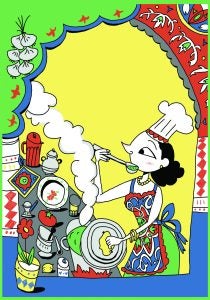
How MAAS alum and food historian Anny Gaul studies cookbooks
By Vicki Valosik
Cookbooks can teach us how to braise a lamb shank, thicken a sauce, or bake a perfect pie crust. But for MAAS alum Anny Gaul (’12), a cultural historian of food and gender, they can do so much more. “Cookbooks can tell us something significant about norms and ideals, what is good taste, what is good food, and how those questions are connected to who we are as a nation,” says Gaul.
That is an argument Gaul explores in her recent Global Food History article “From Kitchen Arabic to Recipes for Good Taste: Nation, Empire, and Race in Egyptian Cookbooks.” In Gaul’s paper, which earned her the Global Food History Prize for an Emerging Food Historian, she takes a deep dive into a unique literary sub-genre: cookbooks written by Egyptian women between the 1880s and 1950s. This was a period in Egypt, says Gaul, when female literacy was on the rise, girls were going to school in greater numbers, and women were beginning to pursue degrees abroad. Domestic science was a popular choice, with programs in England and Europe training female students to run efficient and modern home kitchens. A cohort of these women returned to Egypt to author cookbooks that would become widely influential, finding receptive audiences among the country’s emerging middle-class housewives, as well as the public education system, which often adopted their books as home economics texts.

Gaul’s first introduction to this genre of cookbooks was at a book market in Cairo. She was searching for inspiration for a dissertation topic combining food studies, Arabic, and gender when a bookseller told her about the iconic cookbook author Nazira Niqula. Gaul soon learned that Niqula was just one, albeit the most famous, among many female cookbook authors of the era whose books promoted “modern” methods and dishes. Their books “articulated to women the relatively new idea that their role in nourishing and forming the nation was deeply important,” says Gaul, “and that what they cook really matters to public life and the thriving of their society.” Recipes from Europe and Bilad al-Sham (the Arabic-speaking provinces of the former Ottoman Empire), dominate the cookbooks while foods from Arabic-speaking parts of Africa are nearly absent. Although this may not be an accurate reflection of what people were actually eating, says Gaul, the push toward Western or “modern” cooking, selectively defined, was indicative of broader political and social trends. “People were working out what it meant to be a modern Arab Egyptian, and nationalists and intellectuals were making arguments about Egypt’s place in the world.” Yet despite their value as primary sources, these cookbooks can be nearly impossible to find in Egyptian archives and libraries. Gaul has had to rely instead on Cairo’s booksellers to help her, over multiple trips to the region, develop her own private research collection. Now the owner of more than two dozen of these cookbooks, Gaul plans to make them available to other researchers by donating her collection to the Cairo-based history organization Women in Memory Forum.
Gaul first discovered the potential for using cookbooks as lenses into larger cultural phenomenon during the MAAS program when she wrote a paper on Israeli cookbooks and the extent to which they did (or did not) incorporate Palestinian and other Arab foods. Her interest in cookbooks isn’t strictly scholarly, however. An avid cook and prolific food blogger, Gaul has been known to say that “the best way to study a cookbook is to cook your way through it.” She credits her interest in cooking, as well as her egalitarian perspectives on food hierarchies, to her godmother, a self-taught chef who traveled the world cooking on private yachts. “She was well-versed in fancy continental European cooking,” says Gaul, “but also completely rejected the idea that that was a better or more sophisticated way or more worthy of study or eating than other cuisines in the world. Her perspective has absolutely informed the way I think about food.”
Following MAAS, Gaul earned her PhD from Georgetown’s Arabic and Islamic Studies Department and is now an assistant professor of Arabic Studies at the University of Maryland. Her forthcoming book manuscript will focus on a single ingredient—the tomato—and its rise to become Egypt’s most ubiquitous kitchen staple. Just has she has done with cookbooks, Gaul will demonstrate what this seemingly humble item reveals about ideas of nation, gender, class, and race—leaving readers with plenty to chew on.
Vicki Valosik is the CCAS Editorial Director.
This article first appeared in the Winter/Spring 2022 CCAS Newsmagazine.